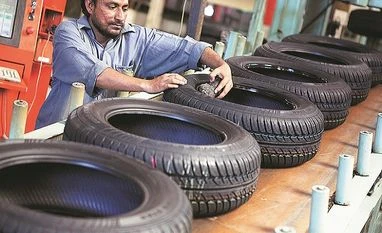After a mixed second quarter (Q2), there are multiple tailwinds for Indian tyre companies. Higher volumes from automotive makers (especially the original equipment manufacturer segment) and steady replacement demand are key drivers on the top-line front. The bigger trigger, however, is the easing of commodity prices on the back of falling crude oil-related inputs, as well as natural rubber prices. Together, the two account for over 60 per cent of the raw material cost as a percentage of sales.
Among listed stocks, CEAT has made the most gains over the past month, as well over three months, rising 11 per cent and 27 per cent, respectively.
Most other tyre stocks have underperformed the market over the past month with a fall of 2-3 per cent.
Balkrishna Industries (Balkrishna) is the only major tyre stock to underperform over a three-month period with a 19 per cent drop as a consequence of demand worries in Europe.
Although revenue growth for the leading players was healthy and upwards of 16 per cent year-on-year, margin performance was mixed.
While CEAT reported an expansion in gross margin on a sequential basis by 82 basis points (bps), Apollo Tyres saw a 10-bp increase.
MRF, on the other hand, saw its gross margins slip 179 bps as price hikes initiated were not able to offset the rise in input costs. Balkrishna, which caters to export markets, too, saw a 220-bp sequential margin contraction in view of higher raw material costs.
Says Nithya Debbadi, assistant vice-president and sector head-corporate ratings, ICRA, “For the fourth straight quarter, industry profit margins remain affected by the effect of elevated input and freight costs. With the softening prices of natural rubber and crude oil derivatives since July this year and a stable pricing environment, the industry’s margins will witness expansion in the second half of 2022-23 (FY23).”
While crude oil prices have dropped by over 35 per cent since their highs in March on China Covid outbreak, sluggish economic growth, and lower crude oil consumption, natural rubber futures prices recently hit multi-year lows.
Natural rubber prices have been under pressure due to concern about global recession, supply-chain issues, and weak China demand for tyres.
In an earlier report, Motilal Oswal Research estimated that a 10 per cent change in natural rubber/synthetic rubber/carbon black prices (over its 2021-22, or FY22, average) is expected to change the operating profit margin by 160 bps/80 bps/100 bps, respectively.
While higher raw material prices put pressure on volumes and margins, lower prices give tyre companies the flexibility to raise prices, especially in the replacement market.
Analysts, led by Joseph George, of IIFL Research believe that MRF’s underperformance on the margin front is a structural positive for the industry.
MRF’s low margin also lowers the risk of price cuts when input costs fall, say analysts at the brokerage. Analysts have cut the FY23 earnings per share of MRF due to high raw material costs.
Brokerages have a ‘buy’ on Apollo Tyres and CEAT.
Motilal Oswal Research believes that among peers, Apollo Tyres offers the best blend of earnings growth and cheap
valuations. The stock is available at just under 12x its 2023-24 (FY24) earnings estimates.
In addition to Apollo Tyres, IIFL Research has a ‘buy’ on CEAT and has upgraded its earnings estimates after Q2 results by 79 per cent for FY23 and 16 per cent for FY24. It expects CEAT’s margins to improve from the present-day 7 per cent to a normalised 10-11 per cent by the fourth quarter of FY24.
Balkrishna, which continues to outperform on the export growth front, is also expected to do well. ICICI Securities has increased its revenue growth assumptions to 16 per cent over FY22-24 on 9 per cent volume growth, given better cost arbitrage, rising focus on improving off-the-road tyre market share, and scaling up of large diameter tyres.
JK Tyre finds mention on the ‘buy’ list due to a robust product basket, regular price hikes, likely revival in replacement demand, healthy export potential, and margin expansion in India and Mexico operations. Reliance Securities has a ‘buy’ rating on the stock as it also offers the additional comfort on valuations at 7.6x its FY24 earnings estimates.
Unlock 30+ premium stories daily hand-picked by our editors, across devices on browser and app.
Pick your 5 favourite companies, get a daily email with all news updates on them.
Full access to our intuitive epaper - clip, save, share articles from any device; newspaper archives from 2006.
Preferential invites to Business Standard events.
Curated newsletters on markets, personal finance, policy & politics, start-ups, technology, and more.
)